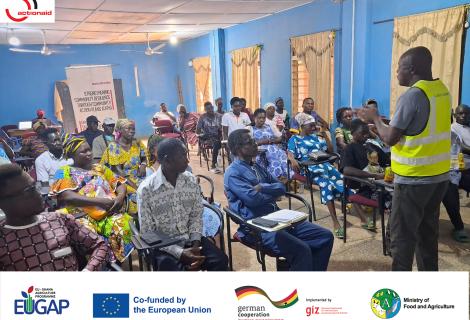Building Resilient Communities through Water Governance: ActionAid Ghana trains community committees on Borehole Management under the EU-REACH-funded CAPs Project

Access to clean and safe water is one of the most pressing development challenges we face today. Globally, 2.2 billion people lack access to safely managed drinking water services (UN, 2023). In Ghana, despite some progress, approximately 31% of rural households still do not have reliable access to improved water sources (GSS, 2021). This situation highlights the critical need for sustainable water governance and strengthening at the community level, a key component of Sustainable Development Goal (SDG) 6, which highlights the need for availability and sustainable management of water and sanitation for all.
In response to these challenges, ActionAid Ghana, with support from the EU/BMZ-cofunded REACH Project, under the Strengthening Community Resilience through Community Action Plans (CAPs) Project, organised an intensive capacity-building training session for Borehole Management Committees (BHMCs) in the Upper West region. The training was held on Monday, August 25, to Wednesday, September 3, 2025, in nine districts, namely Wa Municipal, Wa West, Wa East, Nadowli, Jirapa, Lawra, Sissala East, Sissala West, and West Gonja in the Savannah Region. It formed part of the project's first output, which tackles water management challenges through the construction of boreholes, dams, and irrigation systems. Over the past months, the CAPs project has worked closely with communities to mitigate climate issues confronting them.
Under the project’s output on water management, ActionAid Ghana and the Ghana Water Service, affirm that water is more than a necessity; it is essential for health, education, gender equality, and economic development. Available statistics have proven that the cycles of water insecurity are impeding Ghana’s progress toward achieving Sustainable Development Goal 6 in the Upper West Region.
The comprehensive capacity-building training program held across the targeted project communities, was designed specifically for Borehole Management Committees (BHMCs) with the aim of equipping local groups with the skills, tools, and confidence needed to effectively manage and sustain boreholes as reliable community assets.
The training focused on several key areas:
1. Effective Governance and Accountability: Participants engaged in discussions to clearly define committee roles and responsibilities, fostering an environment of transparency and ethical governance. This clarity is crucial for building trust within the community.
2. Hands-on Technical Knowledge: The program included practical workshops where participants learned about routine maintenance and repairs. These hands-on sessions provided essential knowledge for addressing issues swiftly, significantly reducing downtime for critical water facilities.
3. Financial Sustainability: The training offered guidance on sustainable financial practices. Participants learned effective fee collection methods, budgeting strategies, and transparent record-keeping, key skills for ensuring the long-term viability of the boreholes that would be provided under the project.
4. Community Ownership: A key component of the training was promoting inclusive participation from all community members. By fostering a sense of ownership, trust, and responsibility, the program aimed to enhance the sustainability and resilience of water management efforts within communities. This comprehensive approach empowers communities to tackle water challenges and improve their overall quality of life.
A Step Toward Sustainability
The CAPs project is from the Resilience Against Climate Change (REACH) project, which drives community transformation towards climate-resilient agricultural production and improved livelihoods in North-West Ghana. The eight-day training also affirms the broad objective of building resilience through planning systems from the community to the district level. A major outcome of the training was the development of Facility Management Plans (FMPs) by each borehole community. These plans serve as living documents that outline strategies for maintenance, financial management, and community accountability.
At ActionAid Ghana, we strongly believe that local ownership is critical for working directly with communities for sustainable, people-powered change. This initiative and many others are being introduced in various communities under the CAPs project.
About REACH
The Resilience Against Climate Change (REACH) project drives the transformation towards climate-resilient agricultural production and improved livelihoods in North-West Ghana. The project is a pillar of the European Union Ghana Agriculture Programme (EU GAP) and builds capacities for the widespread adoption of Conservation Agriculture (CA) as well as climate resilience through planning systems from the community to the district level. REACH is implemented by GIZ under the Market-Oriented Value Chains for Jobs and Growth in the ECOWAS Region (MOVE) and co-funded by the European Union (EU) and the German Federal Ministry for Economic Cooperation and Development (BMZ).